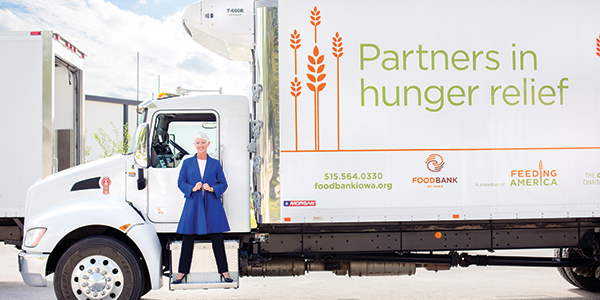
Michelle Book brings corporate experience and discipline to the Food Bank of Iowa, which she joined as president and CEO in February.
Writer: Brianne Sanchez
Photographer: Ivory House Photography

Running a food bank is grueling work: It’s logistics and analytics and warding off rot and addressing rising need. But it’s also meaningful:
It’s feeding hungry people and listening to their stories. It’s harnessing people and raising dollars to make a difference.
At the Food Bank of Iowa, amid its 48,000 square feet of warehouse space, Michelle Book embraces all these challenges. The former DuPont Pioneer senior manager for international community relations took over as CEO and president of the Food Bank of Iowa in February, after the retirement of its executive director, Carey Miller.
The organization’s vision—a hunger-free Iowa—is bold in the face of statistics that tell us 1 in 8 Iowans lacks the resources to ensure a stable, healthful diet. Here, where corn and soybean fields take up entire vistas, hunger can seem like an anomaly. Yet the majority of our agricultural yield goes to feed livestock while 1 in 5 Iowa children struggles to get nutritious meals. In Polk County alone, 55,000 people experience hunger every day.
Book’s leadership offers a fresh perspective, an expansive network, and systems and processes honed in the corporate world. In her previous role, she worked with numerous nonprofit organizations, but Book admits there are unknowns as she settles in on the staff side of charitable work.
“Even though I’ve been on a board, now the table is turned,” she says. “I wear all the hats; the buck stops here. For me, that’s extremely gratifying and frightening at the same time.”
Natural Fit
In some respects, taking the helm at the Food Bank is a natural fit for a former farm girl whose first job was walking beans in Jefferson, Iowa, at age 11. But Book, who earned a reputation as a polished community leader through her professional work and civic involvement, never imagined herself here. Her switch to the nonprofit sector came after personal and career shakeups caused her to re-evaluate her priorities. Her marriage had recently dissolved. The position she’d held for five years in a department she rebuilt and expanded was eliminated.
“I would never have pictured myself single at 55 and the CEO of a nonprofit,” Book says. “This sounds cliché, but I was finding myself asking, ‘Who is Michelle Book, and what do I want my legacy to be?’ I want to be a supportive, loving mother and a good daughter and friend. I come from a place where I was a cog in the wheel of shareholder value. Now I work as hard—probably harder and longer hours—for people I actually meet.”
Book’s passion for food security was sparked on trips to India and Mexico to oversee grant-making initiatives for DuPont Pioneer. The ability to do work so close to home has deepened her professional purpose.
“For me, it’s real, it’s intrinsic and, sometimes, it’s overwhelming,” Book says. Delivering a talk about the Food Bank of Iowa’s work to an audience at Nationwide, she went off-script and got choked up. “That’s never happened to me before.”
Strategic Focus
For Jeff Rommel, the outgoing Food Bank of Iowa board chair and a senior executive at Nationwide, Book’s background of corporate savvy and community impact was
a huge selling point. Her name first came up for the position thanks to Suku Radia, president and CEO of Bankers Trust and Des Moines’ unofficial connector-in-chief.
“She’s got a strong strategic focus and does a nice job of helping the staff understand the mission and purpose,” Rommel says. “I think she’s already (increased our visibility) within the community.”
Awareness of what a food bank does is at the top of Book’s priorities. The Food Bank of Iowa serves as an umbrella organization for nearly 400 front-line agencies (90 in Polk County) in the fight against hunger. A member of the Feeding America network, the nation’s largest domestic hunger-relief organization, the Food Bank is connected to research and best practices.
The organization’s food is rescued, donated or purchased by the pallet, sorted and stored. Meals are distributed to traditional pantries and mobile pop-ups, a weekend BackPack Program, summer service sites and schools. Because of the Food Bank of Iowa, breakfasts, lunches and dinners make their way to the tables of families of all backgrounds who are stuck with difficult decisions. Do they buy groceries or pay rent? Purchase milk or fill a prescription?
“I talk to (our staff) about ‘What are our metrics? How do we measure success? What’s our inventory turn rate and truck utilization rate?’ ” Book says. She’s also keen on prioritizing professional development for her roughly 20 employees, whose passion for their work takes them to 55 of Iowa’s 99 counties. She has re-organized the team and encourages members to brainstorm new ways to solve complex problems.
“Anything that comes to us as innovative—I’ve seen this team embrace it and leverage it if it’s good for our client base,” Book says.
Smoke Out Hunger
This past July, the Food Bank of Iowa launched “Smoke Out Hunger,” a barbecue fundraiser at Brenton Skating Plaza, spearheaded by incoming board chair Mike Barrett. “We wanted to have something that was unique and different and rally people around a cause,” says Barrett, who grew up in Cresco, Iowa, the hometown of World Food Prize founder Norman Borlaug. “One of the basics is food. If people don’t have their basic needs being met, they don’t have the opportunity to learn and grow.”
With increased support, Book hopes the Food Bank of Iowa can double distribution in the next three to five years. Currently, it distributes more than 11 million pounds of food each year.
To accommodate more food moving in and out of the warehouse, Book is also working on a project plan to renovate the Food Bank of Iowa headquarters on Des Moines’ northeast side. The building was once a beer distribution center, and its layout and condition need work to efficiently serve its current purpose. A big oak bar dominates a meeting room, the office is so humid that the lighting doesn’t function properly, and cooler and freezer space is at a premium.
“We need to be able to serve more people more quickly, and a renovation will help us do that,” Book says. “Within five years, I’d like to be the Feeding America Food Bank of the Year. I’d like to come up with some sort of innovative way of getting food to the people who need it most.”
Partnership for a Hunger-Free Polk County
Mission: The Partnership for a Hunger-Free Polk County was formed in 2015 by Polk County Supervisor John Mauro to raise funds to support the efforts of local food pantries and other food providers. The goal is to ensure that the 20 percent of children who are at risk of receiving inadequate nutrition have access to the food they need, not just during the holidays, but every day of the year.
Strategy:
The Partnership commissioned a study to identify obstacles to addressing the needs for emergency food supplies in Polk County. As a result of the study, several key initiatives, including extended hours at some locations and additional pantry sites, were designed to provide more and better access to food resources.
Learn more: hungerfreepolkcounty.org. For more information about the Food Bank of Iowa, visit foodbankiowa.org.










